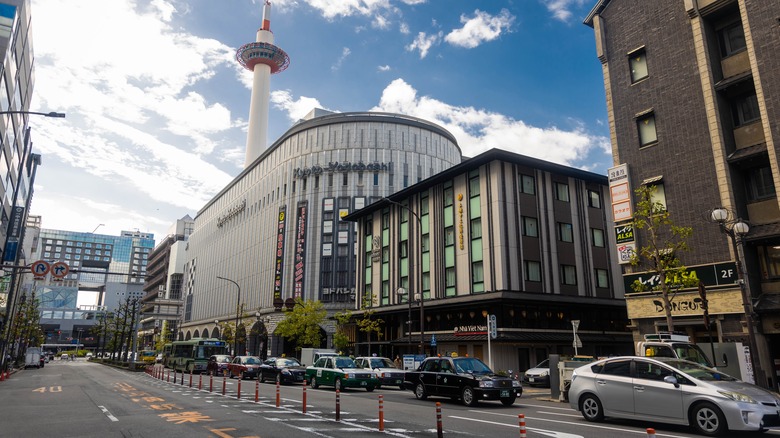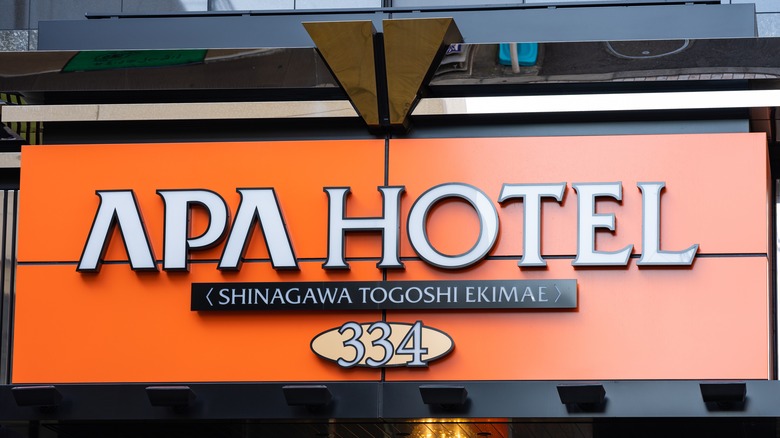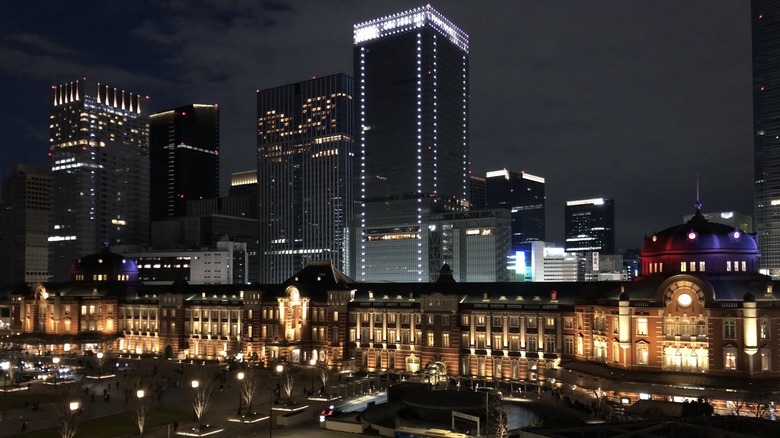Tourists Looking For A Hotel In Japan Should Prioritize Ones Listed With This Word
In Japan, it's easier than ever for international travelers to get around — and, yes, find your hotel — thanks to the general increase in English signs. This trend accelerated in the mid-2010s as the government sought to make cities more tourist-friendly before and after the 2020 Summer Olympics. Sometimes, it can yield awkwardly mistranslated signs, but there are tools for navigating the confusion of those situations, too. Even if you can't read Japanese, this easy iPhone hack translates restaurant menus, signs, and other printed text with your camera's aim. However, when you're in the planning stages of a trip and trying to find a hotel online in an unfamiliar area, there's at least one Japanese word worth knowing. The word is "eki," and it just means "station."
In most cases, you'll probably see "eki" used to denote a train station. In pre-modern times, it signified a rest stop, and Michi-no-eki still means "roadside station." Nowadays, in the context of hotels, "eki" often applies to chains that are distinguishing their station branch from other locations around town. This is why you'll see traveling TikToker @victorkk_ use the example of APA — a no-frills business hotel chain — as he circles the word "eki" in one of his videos. On his trip to Japan, he booked a pair of APA's "eki" tower hotels in Tokyo and Osaka, two cities trending for travel in 2024. Staying in a station tower like those provides quick, convenient access to the bus and railway network for your sightseeing needs.
'Eki' hotels put you in and around the train station
Another form of "eki" you'll often see in the names of hotels and even ramen shops is "ekimae," which means "in front of the station." In the ancient capital of Kyoto, APA has two different station-front branches, with one being centered and the other being off to the side but even closer to the entrance. Keep in mind that "front" is a relative concept when you're dealing with sprawling cities where "there is no feeling of frontality at all," as expert Japanophile Donald Richie observed in his book, "Tokyo: A View of the City."
Daiwa Roynet, another business hotel chain, also has an "ekimae" location about a five-minute walk down the street from Kyoto Station. In the Olympic city of Sapporo, there's an entire street and an underground walkway called Ekimae-Dori, which leads away from the station to the neon-lit entertainment district of Susukino. If you were in town for the annual Sapporo Snow Festival, when over 2 million visitors descend on the city, you might want to book a hotel closer to Susukino or Odori Park, where the festival's ice and snow sculptures are exhibited. With a city like Kyoto, by contrast, you could find yourself looping back more on the station and its extensive network of bus and train lines as you head out to the many beautiful temples and shrines across town. This is when it helps to have a station-area hotel as your home base.
There are exceptions to the 'eki' rule
One last example of a business hotel chain with "eki" branches is Toyoko Inn, which has a "Tokyo-eki" location across from Tokyo Station. Hotels like this are a good option if you're planning to be out sightseeing all day and just need a cheap place to rest your head before you get up the next day and do it all over again. They're the type of chains with compact, budget-friendly rooms that might turn up in a price-based search before you encounter the trick hotel booking websites use to get us to make reservations. Yet, such hotels will only get you so far if you're looking for a room with more space, comfort, and amenities.
Tokyo Station, pictured above, fields over a million passengers a day, and it could take you 10 minutes to walk from one side of it to the other. Or, you could stay inside it at the luxurious Tokyo Station Hotel and potentially hop on the train even quicker than you would coming from a chain hotel with 駅 ("eki") rendered in Roman characters in its name. Likewise, the Kyoto Tower Hotel is right in front of Kyoto Station, but it doesn't have an "eki" name because it's the only one of its kind. Hotel Granvia has branches built right into the station in Kyoto and Osaka, but they have no need to distinguish themselves from other locations with the word "eki," either, since they're the only ones in town.


